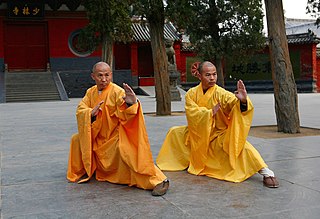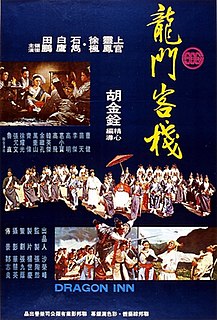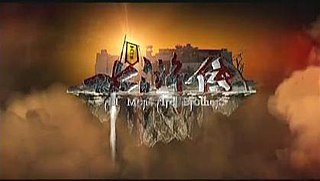
Wuxia, which literally means "martial heroes", is a genre of Chinese fiction concerning the adventures of martial artists in ancient China. Although wuxia is traditionally a form of fantasy literature, its popularity has caused it to spread to diverse art forms such as Chinese opera, mànhuà, films, television series and video games. It forms part of popular culture in many Chinese-speaking communities around the world.

Sammo Hung, also known as Hung Kam-bo (洪金寶), is a Hong Kong actor, martial artist, film producer and director, known for his work in many martial arts films and Hong Kong action cinema. He has been a fight choreographer for other actors such as Jackie Chan.

Tsui Hark, born Tsui Man-kong, is a Hong Kong film director, producer and screenwriter. Tsui has directed several influential Hong Kong films such as Zu Warriors from the Magic Mountain (1983), the Once Upon a Time in China film series (1991–1997) and The Blade (1995). Tsui also has been a prolific writer and producer; his productions include A Better Tomorrow (1986), A Chinese Ghost Story (1987), The Killer (1989), The Legend of the Swordsman (1992), The Wicked City (1992), Iron Monkey (1993) and Black Mask (1996). He is viewed as a major figure in the Golden Age of Hong Kong cinema and is regarded by critics as "one of the masters of Asian cinematography".

Louis Cha Leung-yung, better known by his pen name Jin Yong, pronounced "Gum Yoong" in Cantonese, was a Chinese wuxia novelist and essayist who co-founded the Hong Kong daily newspaper Ming Pao in 1959 and served as its first editor-in-chief. He was Hong Kong's most famous writer.
Hu Jinquan, better known as King Hu, was a Chinese film director and actor based in Hong Kong and Taiwan. He is best known for directing various wuxia films in the 1960s and 1970s, which brought Hong Kong and Taiwanese cinema to new technical and artistic heights. His films Come Drink with Me (1966), Dragon Inn (1967), and A Touch of Zen (1969–1971) inaugurated a new generation of wuxia films in the late 1960s. Apart from being a film director, Hu was also a screenwriter and set designer.
Hong Kong action cinema is the principal source of the Hong Kong film industry's global fame. It combines elements from the action film genre, as codified by Hollywood, with Chinese storytelling, aesthetic traditions, action choreography and filmmaking techniques, to create a culturally distinctive form that nevertheless has a wide transcultural appeal. In recent decades, American and European action films have been heavily influenced by Hong Kong genre conventions.

Dragon Inn is a 1967 Taiwanese wuxia film written and directed by King Hu. The film was remade in 1992, as New Dragon Gate Inn, and again in 2011 as The Flying Swords of Dragon Gate.

Swordsman II, also known as The Legend of the Swordsman, is a 1992 Hong Kong wuxia film very loosely adapted from Louis Cha's novel The Smiling, Proud Wanderer. It was the second part of a trilogy: preceded by The Swordsman (1990) and followed by The East Is Red (1993). Directed by Ching Siu-tung and Stanley Tong, Swordsman II starred Jet Li, Brigitte Lin, Rosamund Kwan and Michelle Reis in the leading roles. None of the original cast from the previous film return except Fennie Yuen.

A Touch of Zen is a 1971 wuxia film co-edited, written, and directed by King Hu. Its screenplay is based on a classic Chinese story Xiannv in the book Liaozhaizhiyi by Pu Songling. The film is set in the Ming dynasty under the dominance of Eunuches and narrates multiple themes of transcendence to dichotomies, Zen Buddhism, feminism, conservative female roles, and the ghost story. At the 1975 Cannes Film Festival, the film won the Technical Grand Prize award.

Jiang Hu is a 2004 Hong Kong crime drama film revolving around Hong Kong gangs. It was directed by Wong Ching-po and stars Andy Lau and Jacky Cheung. The film is also known as Blood Brothers in Singapore, and Triad Underworld in the United States.
Shek Wing-cheung, better known by his stage name Shih Kien, Sek Kin, or Sek Gin, was a Hong Kong–based Chinese actor. Shih is best known for playing antagonists and villains in several early Hong Kong wuxia and martial arts films that dated back to the black-and-white period, and is most familiar to Western audiences for his portrayal of the primary villain, Han, in the 1973 martial arts film Enter the Dragon, which starred Bruce Lee.

Cheng Pei-pei is a Chinese actress perhaps best known for her performance in the 1966 King Hu wuxia film Come Drink with Me. She is more known for her portrayal of Jade Fox in the award-winning 2000 wuxia film Crouching Tiger, Hidden Dragon.
Chen Wentong, better known by his pen name Liang Yusheng, was a Chinese writer. Credited as the pioneer of the "New School" (新派) of the wuxia genre in the 20th century, Chen was one of the best known wuxia writers in the later half of the century, alongside Jin Yong and Gu Long.
Kung fu film is a subgenre of martial arts films and Hong Kong action cinema set in the contemporary period and featuring realistic martial arts. It lacks the fantasy elements seen in wuxia, a related martial arts genre that uses historical settings based on ancient China. Swordplay is also less common in kung-fu films than in wuxia and fighting is done through unarmed combat.

Martial Arts of Shaolin aka Shaolin Temple 3: Martial Arts of Shaolin, is a 1986 Hong Kong–Chinese martial arts film. It is notable as the only collaboration between film director Lau Kar-leung and actor Jet Li. The film was later released on Region 1 DVD by The Weinstein Company under the Dragon Dynasty imprint.

This is the filmography of Hong Kong singer, actor and film producer Andy Lau.

The East Is Red, also known as Swordsman III, is a 1993 Hong Kong wuxia film. The main character in the film is loosely based on Dongfang Bubai, a character in Louis Cha's novel The Smiling, Proud Wanderer. The film was produced by Tsui Hark, directed by Ching Siu-tung, and starred Brigitte Lin, Joey Wong and Yu Rongguang. The film is regarded as a sequel to The Swordsman and Swordsman II.

All Men Are Brothers is a 2011 Chinese television series adapted from Shi Nai'an's 14th century novel Water Margin, one of the Four Great Classical Novels of Chinese literature. The series is directed by Kuk Kwok-leung and features cast members from mainland China, Taiwan and Hong Kong. The series was first broadcast on 8TV in March 2011 in Malaysia.

The Legend of the Condor Heroes is a 2017 Chinese television series adapted from Louis Cha's novel of the same title and a remake of the 1983 Hong Kong television series based on the same novel. The series was directed by Jeffrey Chiang and starred Yang Xuwen, Li Yitong, Chen Xingxu and Meng Ziyi in the lead roles. It started airing on Dragon TV in mainland China on 9 January 2017, and on TVB Jade in Hong Kong on 8 May 2017.
Li Shoumin, better known by his pen name Huanzhulouzhu, was a Szechwan-born Chinese wuxia and xianxia writer.













